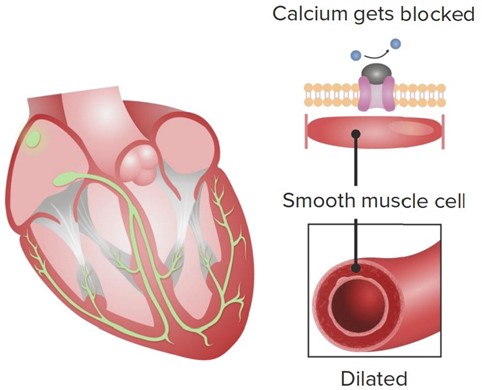What term is used to identify when a cell is temporarily deprived of blood supply
Infarction
Ischemia
Necrosis
Inflammation
The Correct Answer is B
Ischemia refers to the temporary deprivation of blood supply to a particular tissue or organ, resulting in reduced oxygen and nutrient delivery to cells. This can lead to cellular injury and, if prolonged, irreversible damage. Infarction, on the other hand, refers to the death of tissue due to prolonged ischemia. Necrosis is a type of cell death that occurs when cells are damaged or injured and cannot survive. Inflammation is the body's response to tissue injury or infection, and can be a result of ischemia or necrosis.
Nursing Test Bank
Naxlex Comprehensive Predictor Exams
Related Questions
Correct Answer is B
Explanation
Calcium channel blockers (CCBs) are a class of medications that block the influx of calcium ions into cardiac and smooth muscle cells, leading to relaxation of these muscles and dilation of blood vessels.
In the heart, CCBs primarily affect the L-type calcium channels in the cardiac myocytes, which are responsible for the influx of calcium ions during the plateau phase of the cardiac action potential. By blocking these channels, CCBs decrease the amount of calcium that enters the cardiac myocytes, which in turn reduces the strength of cardiac contractions (i.e. contractility). 
This reduction in contractility can be beneficial in certain conditions where the heart is working too hard or experiencing insufficient blood flow, such as in hypertension, angina, or some forms of arrhythmia. By reducing the workload of the heart, CCBs can help to lower blood pressure, decrease oxygen demand, and improve blood flow to the heart.
While CCBs can also have effects on the rate and rhythm of cardiac contractions, these effects are generally less pronounced than the reduction in contractility. Some CCBs, such as verapamil and diltiazem, can slow the heart rate by blocking the L-type calcium channels in the sinoatrial (SA) and atrioventricular (AV) nodes, while others, such as nifedipine, have little effect on heart rate.
Correct Answer is A
Explanation
Cystic fibrosis is a genetic disorder caused by mutations in the CFTR gene, which is inherited in an autosomal recessive manner. This means that a child must inherit two copies of the mutated gene (one from each parent) to develop the disorder. If only one parent carries a copy of the mutated gene, their children will not develop cystic fibrosis but may be carriers of the gene.
Whether you are a student looking to ace your exams or a practicing nurse seeking to enhance your expertise , our nursing education contents will empower you with the confidence and competence to make a difference in the lives of patients and become a respected leader in the healthcare field.
Visit Naxlex, invest in your future and unlock endless possibilities with our unparalleled nursing education contents today
Report Wrong Answer on the Current Question
Do you disagree with the answer? If yes, what is your expected answer? Explain.
Kindly be descriptive with the issue you are facing.
